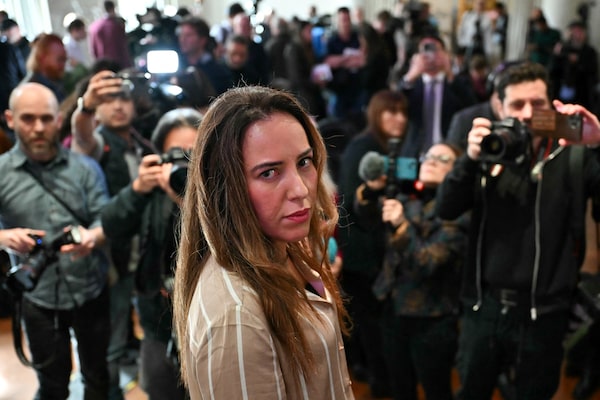
WikiLeaks founder Julian Assange greets supporters on May 19, 2017, outside the Ecuadorian Embassy in London, where he had been in self imposed exile since 2012.Frank Augstein/The Associated Press
Lawyers for WikiLeaks founder Julian Assange will be in a London courtroom this week to make a final bid to stop his extradition to the United States, but his supporters concede the legal move is a long shot and that it will take political intervention to save him.
A pair of High Court judges will hold a two-day hearing starting Tuesday to consider arguments about whether Mr. Assange, 52, should be allowed to appeal a previous court ruling that cleared the way for him to be sent to the U.S.
American prosecutors have charged him with computer hacking and 17 violations of the Espionage Act, a century-old law that prohibits anyone from unlawfully obtaining and publishing information relating to national defence. If convicted, he could face up to 175 years in jail.
Mr. Assange’s wife, Stella, said she was not hopeful about the coming hearing.
“I’ve learned not to be optimistic,” she told reporters last week. “The situation is extremely grave.” She added that if the judges rule against Mr. Assange, “he could be on a plane within days.”
All of Mr. Assange’s charges relate to the publication by WikiLeaks of more than 250,000 secret military cables, reports and briefing notes in 2010 and 2011. The material exposed atrocities by U.S. soldiers in Afghanistan and Iraq, and led to an outcry over American foreign policy.
British courts have deemed Mr. Assange a flight risk, and he has been in Belmarsh Prison ever since his indictment in 2019.
In 2020, District Judge Vanessa Baraitser blocked Mr. Assange’s extradition on humanitarian grounds. She ruled that if convicted in the U.S., he would be imprisoned in a super-maximum facility in Florence, Colo., called ADX Florence, where isolation is extreme and mental-health services are limited. The judge cited evidence that Mr. Assange suffered from depression and had persistent thoughts of suicide.
That ruling was overturned a year later by an appellate panel of three High Court justices after the U.S. Department of Justice provided assurances that Mr. Assange would not be sent to ADX Florence, and that he would not be subjected to restrictive solitary confinement measures reserved for prisoners convicted of terrorism and national security violations.

Stella Assange, wife of WikiLeaks founder Julian Assange, arrives for a press conference at the The Royal Overseas League, in London, on Feb. 15, prior to a court hearing on his extradition case.BEN STANSALL/Getty Images
But Mr. Assange’s legal team has argued the assurances are meaningless because they are conditional and could be ignored.
His supporters insist the case against him concerns freedom of the press, and that if he is convicted, it would have a chilling impact on all journalists.
“We believe that this case has a lot of implications for journalism and press freedom around the world, not least of all as he would be the first publisher tried under the U.S. Espionage Act,” said Rebecca Vincent of Reporters Without Borders, a Paris-based organization that campaigns for press freedom.
“This means that this precedent could be applied to any others who publish stories based on leaks or classified documents.”
The campaign to release Mr. Assange has gained some notable followers, including artist Andrei Molodkin. The Russian dissident, who lives in France, has launched a project called Dead Man’s Switch, which involves a safe room filled with 16 pieces of donated art including works by Pablo Picasso, Andy Warhol and Rembrandt. Mr. Molodkin said the art will be destroyed if Mr. Assange dies in jail.
In Australia, where Mr. Assange holds citizenship, members of Parliament on Wednesday backed a motion calling for his return. The country’s Prime Minister, Anthony Albanese, urged the U.S. to drop the extradition request.
“This thing cannot just go on and on and on indefinitely,” he told the House of Commons.
Ms. Assange said the extradition case “from beginning to end” was politically motivated and that “it needs a political solution.”
Ms. Vincent said there have been continuing discussions between officials in Australia and the U.S. about Mr. Assange’s release. One possible outcome would be for him to be released for time served, given that he has spent five years in jail, she said.
She noted that a key player in the WikiLeaks case – former U.S. Army intelligence officer Chelsea Manning – spent seven years in a U.S. prison before president Barack Obama commuted her sentence in 2017. Ms. Manning was convicted of 20 espionage offences for stealing secret military documents and passing them on to WikiLeaks.
“So it’s frankly absurd that since the leaker, who has already been in prison for seven years and has been released, that the publisher would face possibly 175 years,” Ms. Vincent said. “It does not make sense in any country.”
 Paul Waldie
Paul Waldie